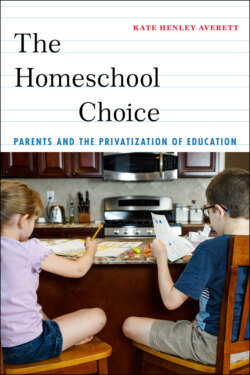Читать книгу The Homeschool Choice - Kate Henley Averett - Страница 25
На сайте Литреса книга снята с продажи.
Childhood Gender and Sexuality in Parents’ Motivations for Homeschooling
ОглавлениеThere is great variation in the motivations of homeschooling parents, and certainly not all of these motivations center on issues of gender and sexuality. In fact, few of the parents whom I interviewed for this project would be likely to consciously identify “gender and sexuality concerns” as one of the reasons why they homeschool. Yet themes related to gender and sexuality popped up frequently both in these interviews and in the talks at the homeschooling conferences I attended.
The themes that arose throughout my research largely cluster around two central critiques of gender and sexuality in American public schools. The first is that schools are too sexual and are a threat to the sexual innocence of children; thus, pulling children from the school environment and educating them in the home can serve as a way to protect “innocent” children from the influence of their peers, the school curriculum, and a perceived broader liberal agenda in public schools. This idea appeared frequently in the religious homeschooling events I attended, and many (but not all) of the parents who invoked this critique identified as conservative and/or religious. The second critique is not that schools are too sexual, per se, but that they promote a narrow understanding of gender and sexuality: that the heterosexual and/or traditionally gendered space of the school forces children to adhere to a model of gender and sexuality that is, at best, constraining or alienating and, at worst, dangerous. Many of the parents who invoked these ideas were politically liberal and nonreligious, and many (but not all) were unschoolers. In the following sections, I will discuss and give examples of these two critiques, and in doing so, will argue that they stem from two differing ideological constructions of childhood.
